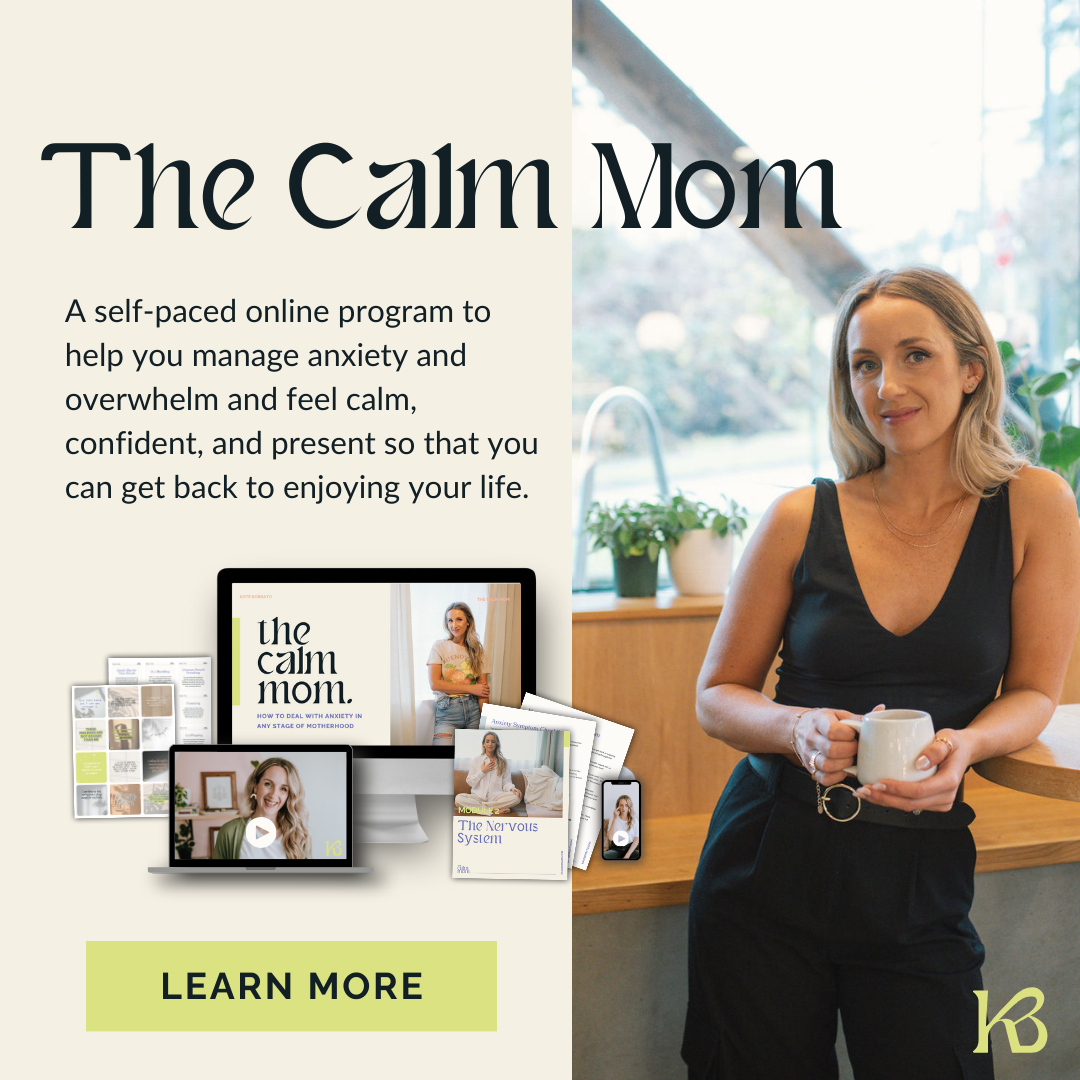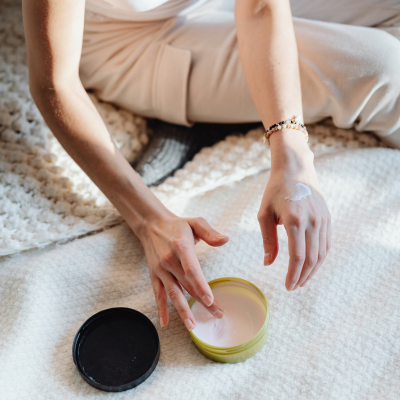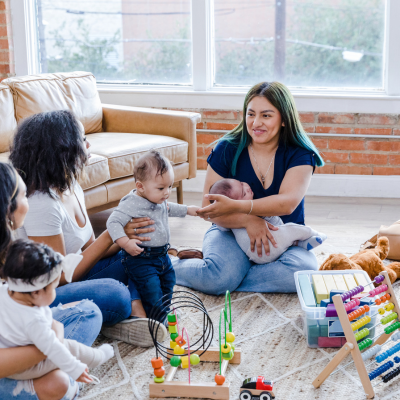OCD in moms is a mental health issue that requires a lot of self awareness, attention and skills. Here’s how you can start
OCD (Obsessive Compulsive Disorder) is an area of anxiety that is often misunderstood, neglected, or flies under the radar.
Quite a large portion of women actually struggle with OCD in motherhood or pregnancy but they’re not even aware of it. Because of that, they don’t end up getting the support that they need.
Since OCD is a mental health issue that’s so often misrepresented in pop culture and in mainstream conversation, so many people don’t relate to its symptoms.
When myths or stereotypes become so prevalent, they actually skew our personal definition or understanding of something. For example, when thinking of OCD, what comes up? Someone obsessed with showering multiple times a day? A person who has a need to count *everything*? An obsessive hand washer? Maybe someone who keeps their home spotlessly clean at all times?
These are some of the common stereotypes of a person suffering from OCD… but they leave a lot out of the conversation. That’s how our own experiences with OCD in motherhood get missed.
If you suspect you’re dealing with OCD (or you already know that you are) and you’re looking to get a better handle on your symptoms, you’re in the right place. Here, a more well-rounded explanation of OCD in motherhood plus three ways where you can start to manage your symptoms.

What does OCD in motherhood look like on a daily basis?
Because OCD is a type of anxiety, many people notice certain symptoms or anxious behaviours in themselves but assume it’s just anxiety—and nothing more. The most important distinction to make between OCD and general anxiety is that OCD is a loop.
It starts with a thought or obsession which then triggers a response. It’s important to know that the response could be anything from hypervigilant cleaning to avoid food poisoning but it could also be overthinking, worrying, or ruminating.
Many people don’t realize that the compulsion or action that continues the OCD loop can be mental. So you may have a habit of ruminating over a conversation that has happened in the past or you worry endlessly until you have the right solution to a problem.
That constant need to turn something over again and again in your mind may be getting in the way of other things but because you’re not scrubbing the bathroom counter for the sixth time today or you’re not pulling out the hand sanitizer every other minute, you don’t see it as OCD.
But think about it: if constantly washing, cleaning, tidying or counting is seen as a problem, shouldn’t stressful, non-stop overthinking or keeping yourself awake all night worrying also be recognized as an issue?
Here are some other examples of how OCD in motherhood could show up:
- Having one specific intrusive thought related to school trips, outdoor sports, or the holidays that you can’t stop obsessing over, and you worry about what it means.
- Being unable to mentally shut off after kids’ appointments with medical professionals, and then repeatedly checking on your child to help soothe your worries.
- Feeling anxious about an upcoming trip and then overthinking all the details and never feeling fully prepared
- Worrying about a feeling that you have toward your child, and then researching to make sure it’s normal, only to feel worried about it again.
Usually the action (or compulsion) is the response to the anxiety. And it’s your way of trying to gain control. For more, see my full breakdown on how OCD shows up for moms.
Easing your symptoms: 3 ways to start managing your OCD
If you know that you’re dealing with OCD in motherhood, or you’d describe yourself as an anxious mom but suspect it’s more than just anxiety, this is a great jumping-off point.
These below suggestions are ways to start managing OCD. OCD in moms is a mental health issue that requires a lot of self awareness, attention and mental redirecting. Here’s how you can start:
Learn as much as possible
Knowledge is power. When you gain a deep understanding of anxiety in motherhood and OCD specifically, you’ll be better able to understand why it happens, who it affects, what symptoms might look like for the general population, and why OCD in moms is such a common experience.
Everything is treatable… but you can’t figure out how to treat something if you don’t know what you’re dealing with in the first place. Learn the difference between OCD and general anxiety. Follow the experts. Read what has been written by those in the niche. Ask questions. Visit a therapist to get more information. The more you understand, the less worrisome your own symptoms become.
Build self awareness
Once you know what OCD symptoms might look like for the general population (i.e. that it’s not just handwashing and step counting), you can start tuning into what OCD looks like for you!
Is there one intrusive thought in particular which you can’t stop going over in your mind? Has covid-related health anxiety got you stuck in some sort of ritual that you think will prevent illnesses for you and your family? Do certain types of conversations trigger you and leave you ruminating for an entire night?
Once you move beyond general knowledge, you can hone in on your own experience with OCD in motherhood. Identify your patterns, suspected triggers, energy levels, fears, and times when you most want to gain control. One tactic could be to journal. Write it down, get as specific as possible and really delve into the details. Do you over-research a lot? What topics do you generally seek out information on? Do you ruminate over a specific fear? What’s going on when that happens? Be explicit and detail-oriented in your own notes so you can gain as much awareness on your own patterns as possible.
Resist the compulsions
Even though the “compulsion” or “action” component is the thing that makes sufferers feel like they have control, it actually just perpetuates the cycle.
You may feel as though you can manage a situation when you lean into your compulsions but really, they just add fuel to the fire. When you think about it, does repeating yesterday’s conversation in your head yet another time change the outcome? Does going through the vacation checklist for a 10th time prevent anything different than if you just re-checked once? Likely not.
What we want to do with all types of anxiety is learn to sit with the discomfort. The second guessing, the worrying, or the uncomfortable feelings will pass if you do not give them power over you. For people who are used to controlling, or actively fixing things, this can seem counterintuitive. If you’re dealing with OCD in motherhood though, the best way to start to deal with your symptoms is just by accepting them… but not engaging.
While focusing on becoming self-aware and accepting our OCD symptoms without engaging in our specific compulsions are important, getting better at anxiety management overall is essential. In my program The Calm Mom, I teach all about anxiety, including the underlying causes and how to set yourself up for success when your triggers are firing. I also teach ERP (Exposure Response Prevention) skills that help people manage OCD.









Comments +